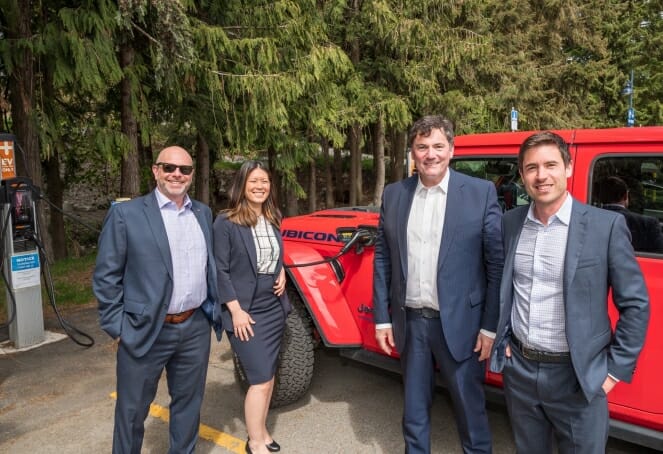The Resort Municipality of Whistler (RMOW), District of Squamish, Village of Pemberton and Lil’wat Nation are pleased to announce that they have received funding to install a total of 41 new electric vehicle (EV) charging stations across the Sea to Sky corridor over the next four years.
The addition of the new EV charging stations will significantly increase the number of public charging stations available in the corridor, supporting the global transition to electric vehicles and reducing greenhouse gas emissions.
“Building this infrastructure will be a critical step towards getting more people into EVs and lowering our regional GHG emissions,” said Whistler Mayor Jack Crompton. “Receiving this funding was a collaborative effort and demonstrates that mitigating our impact on climate change is something we need to achieve together, rather than individually. These new stations will make it easier for residents and visitors alike to recharge their EVs and is one more important step in tackling our regional GHG impacts.”
The funding is provided through the CleanBC Communities Fund, which provides provincial and federal funding for community infrastructure projects that reduce reliance on fossil fuels. The grant application was led by the RMOW, with support from the three other regional partners.
“Through CleanBC, we’re working across governments to help give people cleaner, better options for getting around their communities that will improve local air quality and reduce climate pollution,” said George Heyman, B.C. Minister of Environment and Climate Change Strategy. “This project will significantly expand the number of fast-charging electric vehicle stations available to people and will help accelerate local action to address the climate crisis.”
A total of 28 dual-port Level 2 charging stations are currently being planned across the corridor. Of those, 16 will be in Whistler, eight will be in Squamish, two will be in Pemberton and two will be in Lil’wat Nation’s Mt. Currie and Xit’olacw neighbourhoods. Level 2 chargers can fully charge a car in five to eight hours, depending on the type of vehicle.
In addition, 13 Level 3 Direct Current Fast Charger (DCFC) stations are being proposed, including nine in Whistler and four in Squamish. Level 3 DCFC chargers can fully charge a car in 20 to 60 minutes. Specific locations of all new chargers will be announced at a later date by each individual community. The funding will also be used to improve and upgrade components of the electricity grid needed to support charging stations, such as transformers and electrical panels.
The CleanBC Communities Fund is provided through a cost-sharing model. Federal Government contributions are set at 40 per cent, Provincial Government contributions at 33.3 per cent, and partner contributions at 26.7 per cent.
“Investments into green infrastructure will build healthy, resilient, and sustainable communities today that will allow us to prosper well into the future. All orders of government are working together across BC to ensure communities adopt green technologies that will improve residents’ quality of life, create good-paying jobs, and help reach our 2050 net-zero targets. Through a $1.2 million federal investment for an upgraded electrical grid and 41 new EV charging stations, the Sea to Sky corridor will continue to make progress on tackling its largest source of emissions,” said Patrick Weiler, Member of Parliament for West Vancouver—Sunshine Coast—Sea to Sky Country.
“Transportation accounts for more than half of the carbon emissions in our community and the District of Squamish is exploring opportunities to enhance EV infrastructure, and encourage citizens to make the shift to EV ownership, especially those who do not have access to charging infrastructure at home,” said District of Squamish Mayor Karen Elliott. “These additional EV chargers help demonstrate our climate action commitment to our community and to our visitors, and we are grateful to the CleanBC Communities Fund for this contribution.”
“Passenger vehicles are the largest contributor of greenhouse gas emissions in the Village of Pemberton, so facilitating the switch to electric vehicles is a priority for our community and a key strategy of the Village’s Draft Community Climate Action Plan,” said Mayor Mike Richman. “We are delighted to be a part of this expansion. The purchase and installation of these new EV charging stations will assist in the local development of a public EV charging network and help the Village meet its emission reduction targets.”
In Whistler, installation of the new EV stations aligns with the Climate Action Big Moves Strategy, the Climate Energy and Climate Action Plan, the Official Community Plan and priority actions from the Whistler Transportation Action Plan 2018-2028, developed by the Transportation Advisory Group.
To learn more about EVs in Whistler, visit whistler.ca/ev.
Photo:
From left to right: Councillor Ralph Forsyth, the Honourable Bowinn Ma, the Honourable Dominic LeBlanc, and Member of Parliament Patrick Weiler

